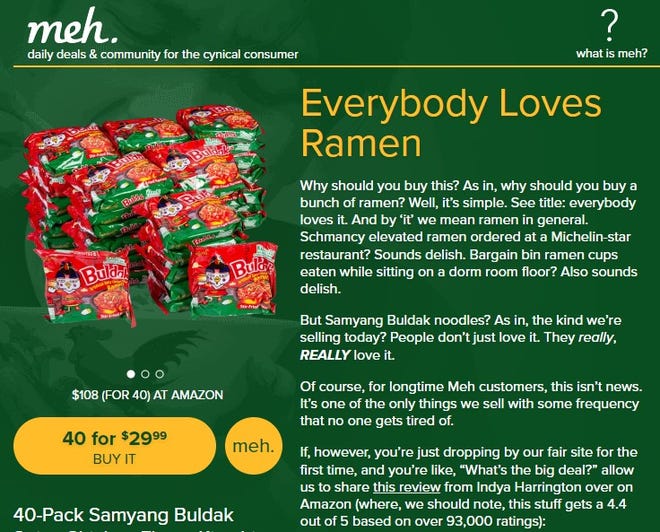“Meh” about Woot? Its old spirit lives on at Meh.com | Gadget Daddy

It is July 12, 2004 — nearly 20 years ago — and Matt Rutledge has a webpage with a deal for you: a robotic lawn mower.
That was the only item offered on the webpage. And when it was gone, it was gone. If it didn't sell out, it would be withdrawn at midnight, and replaced by another item. But just one. And so on.
Since Rutledge was in the electronics wholesale business, the sale item was likely computer related, like a keyboard or hard drive, or an electronic gadget of some sort. Or maybe a close-out item, like a T-shirt or toolkit. And the daily item always had a surprisingly low price — one designed to make that item move.
The accompanying text describing the item — what would normally be a sales pitch — was lightly written and usually had a good deal of humor included. It was one reason Woot's users came back every day.
And shipping for any item was $5. Mattress or marshmallow, it didn't matter. $5.
Computer users who have been around awhile might recognize the site as Woot (www.woot.com).
Woot is celebrating turning 20 this month. While the website is still around, the site itself is hardly recognizable from what it was in 2004.
That's because in 2010, Woot was acquired by Amazon. Amazon has lots of products it wants to move. There are hundreds of items up for sale today. And tomorrow. And the day after.
The day I visited Woot, there were eight categories of items for sale, each one containing dozens of items. There were 834 for sale in the electronics category alone.
Part of the Woot sale to Amazon included Rutledge staying on in an advisory capacity. But Amazon didn't have the same attitude about selling items that Woot did. Its write-ups about the items for sale lacked the snap and crackle that Woot's had.
What happened next is succinctly explained in a D Magazine article published in 2014 and written by Tim Rogers: "In 2012, two years into his three-year deal with Amazon, Rutledge walked. He won’t say how many millions his early departure cost him, but his contract with Amazon included a three-year non-compete clause from the date of sale, and he was watching the clock."
When the clock struck three years, Rutledge went into action. He launched Meh.com. The "meh" first appeared in usage in 1992, according to the Oxford English Dictionary, and is probably from a borrowing from Yiddish meaning "so-so."
Is that baby monitor safe from hackers?FCC rolls out Cyber Trust Mark | Gadget Daddy
Why Meh? Rutledge explained to Rogers: "The cliche thing, the least exciting way to look at what I’m doing again, is that I’m a jaded entrepreneur. You know, sold my company, didn’t like the large corporation, and I’m just doing it again."
As you might imagine, Meh features one deal a day. On the day I visited for this column, the item was Charlee Bear beef and sweet potato treats for dogs. The price was eight packs for $24. Added to just above that price: "$144 (for 8) AT AMAZON."
And this is included in the description: "Of course, all of this has to do with your dog’s healthy body and digestive system. But how, you might be thinking, do I maintain my dog’s healthy mind?

"It’s simple. By making sure they spend some time each day reading. And if your response to that is, 'My dog can’t read!,' all we’ll say is, it probably just seems that way because you don’t give them the kinds of books they can relate to and enjoy. But hand them a classic tome of dog literature, and it’ll be a whole different story. You know, something like:
"The Hound and The Fury
"Jane Airedale
"One Flew Over the Cockapoo’s Nest
"Slobberhouse Five
"Yes, these puns are stupid. But these treats are not. They’re actually very good. So you should buy some."
So Woot, the website, is turning 20. And the spirit of Woot lives on as well.
Perhaps you're glad. Or maybe just Meh.
Lonnie Brown can be reached at LedgerDatabase@aol.com.